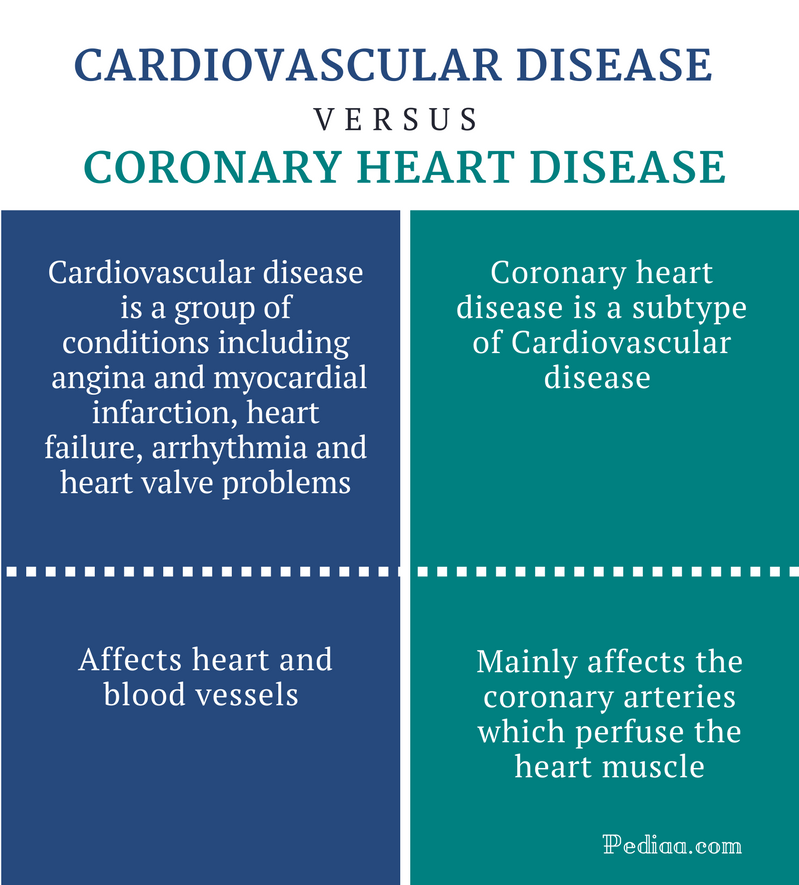
Image source: http://pediaa.com/wp-content/uploads/2016/10/Difference-Between-Cardiovascular-Disease-and-Coronary-Heart-Disease-infographic.png
Before knowing how to survive a heart attack, you must first know what is happening to your body when a heart attack occurs.
WHAT HAPPENS IN A HEART ATTACK?
A sudden rupture in the artery walls may leads to blood clot formation across arteries causing blockages in arteries. This will result as a barrier for blood to flow through these blocked arteries. As a result, the heart muscle becomes starved for oxygen and sudden death of heart muscle cells will occur, causing permanent damage. This process is called a heart attack. A heart attack is also known as myocardial infarction (MI). A heart attack can also occur by a spasm of a coronary artery. During coronary artery spasm, the coronary arteries restrict the blood supply to the heart muscle resulting heart attack.
HOW TO SURVIVE A HEART ATTACK?
To survive from a heart attack can be done in three important steps.
Assessing the signs of a heart attack
1) Pay attention to chest pain
You may be experiencing sudden crushing pain for heart attack rather mild chest pain. During a heart attack, you will feel the pain like a heavy weight on your chest, or pressure or tightness around the chest. You may be experiencing a heart burn. There is a chance of spreading the pain to other body parts like neck, shoulders, back, jaw, teeth, and abdomen
2) Be aware of other symptoms
Some people will not experience chest pain during heart attack, so must aware of other symptoms like
shortness of breath, feeling sick to your stomach, dizziness or lightheadedness, anxiety
3) Know the signs of a heart attack in women
A common symptom for women and men is chest pain. But there are some cases where heart attack occurs with mild chest pain or without chest pain. Women, some older peoples and people with diabetes will have the following symptoms
There will be a sudden crushing pain for heart attack that may appear and recede, or may begin slowly and increase in severity over time, the ease with rest and increase during physical exertion.
There will be pain in the jaw, upper abdomen, neck or back
There will be cold sweats, nausea, and vomiting
Breaking out in cold, nervous sweat is a common symptom in women( like stress or anxiety)
Shortness of breath, lightheadedness and fainting
Sudden, unusual or unexplained fatigue
Anxiety
4) React quickly to symptoms.
Those who reach the hospital with in the first hour of heart attack have higher chance of survival
Dont ignore any symptoms, seek medical attention as soon as possible
Getting help during a heart attack
1) Seek medical attention immediately
2) Make people aware that you may be having a heart attack
If you are with your family or you are out in public while experiencing heart attack, let people know to take you to hospital
3) Minimize activity
Sit down, rest and wait for emergency medical services to arrive. Exertion can strain your heart during heart attack
4) Take an aspirin or nitroglycerin, if appropriate.
Recovering from a heart attack
1) Follow professional medical advice after the heart attack
You must follow your doctors prescriptions and advice when you survive a heart attack. There will be medications to lower your blood clotting. And you must be advised to take the medication for the rest of your life.
2) Be aware of changes in your emotions and outlook
There is a chance of having depression for the patients after having a heart attack. And depression may develop from the following thoughts
Embarrassment
Self-doubt
Feelings of inadequacy
Guilt over previous lifestyle choices
Fear or uncertainty about the future.
Support from family, friends and relatives can bring the patient back to normal life.
3) Know the risks of a second heart attack
If you have a heart attack, then the chance for having the second heart attack is higher. The chance of having second heart attack can increase by the following the factors
Smoking
Stress
High cholesterol
Diabetes
High blood pressure
Obesity
inactivity
4) Make changes in your lifestyle
Bringing new changes in your life can make you healthy and prevent from having a second heart attack. You must include following factors in your lifestyle to make you healthy
Stop smoking.
Reduce your weight
Cut down on alcohol consumption
Lower your cholesterol.
Reduce your intake of saturated and trans fats
